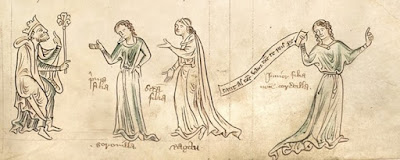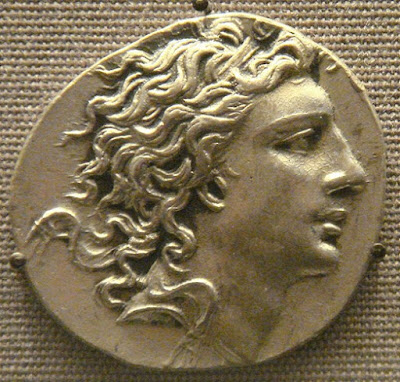Posteā Cimbrī et Teutonēs, quī agrōs in Galliā et Hispāniā vastābant, Rōmānōs in pugnīs multīs superāverant. Sed Marius, quem populus Rōmānus imperātōrem creāverat, Teutonēs prope Aquās Sextiās et Cimbrōs prope Vercellās vīcit. Inde Marius et Sulla cōpiās Rōmānās contrā Mithridātem dūcere voluērunt. Sed, ubi Sulla Marium Rōmā expulit, populus Rōmānus Sullam imperātōrem fēcit. Sulla cum cōpiīs multīs et nāvibus ex Ītaliā discessit, atque, postquam Mithridātem superāvit, Rōmam pervēnit et erat dictātor. Omnēs inimīcōs necāvit aut expulit, lēgēs multās fēcit, potestātem Senātōrum auxit. Post annōs paucōs imperium tōtum senātōribus dedit atque prope Puteolōs vīvēbat.
Notes
[1] The names of some towns and
cities in Latin are plural:
Aquae Sextiae,
Aix-en-Provence, city and commune in Southern France
Vercellae, now Vercelli,
city and commune in Piedmont, Northern Italy
Puteolī, a coastal
city in Campania, now Pozzuoli
Therefore, these town / city
names will decline in the plural:
Teutonēs prope Aquās Sextiās
et Cimbrōs prope Vercellās vīcit. │ He defeated the Teutons near Aquae
Sextiae and the Cimbri near Vercellae.
prope Puteolōs vīvēbat │ he lived
near Puteoli
[2] Sentence structure: clauses of time
It is becoming more important now to see the difference
between certain types of word or phrase
[i] ubi (when); postquam (after): these are conjunctions
which join two parts of a sentence (clauses) and introduce subordinate clauses
of time (known in grammar as temporal clauses)
Sed, ¦ ubi Sulla Marium Rōmā expulit [subordinate
clause of time], ¦ populus Rōmānus Sullam imperātōrem fēcit. │ But, ¦ when
Sulla had expelled Marius from Rome ¦ the Roman people made Sulla the
commander.
Sulla … postquam Mithridātem superāvit [subordinate
clause of time], Rōmam pervēnit et erat dictātor. │ Sulla …¦ after he
had conquered Mithridates, ¦ reached Rome and was dictator.
[ii] The two examples below are [a] an adverb
(posteā) and [b] an adverbial phrase (post annōs multōs), a phrase
created from two or more words which are not separately adverbs but when put
together act like an adverb. They do not introduce clauses but give additional
information about the action.
[a] Posteā Cimbrī et Teutonēs, …, Rōmānōs in pugnīs
multīs superāverant. │ Afterwards the Cimbri and Teutons, … had
conquered the Romans in many battles.
[b] Post annōs paucōs imperium tōtum senātōribus
dedit …. │ After a few years he gave all political authority to the
senators.
[3]
Cimbrī et Teutonēs, …, Rōmānōs in pugnīs multīs superāverant.
│ The Cimbri and Teutons … had defeated the Romans in many battles.
Sed Marius, quem populus Rōmānus imperātōrem creāverat,
Teutonēs prope Aquās Sextiās et Cimbrōs prope Vercellās vīcit. │ But Marius, whom the Roman people had
made commander, conquered the Teutons near Aquae Sextiae and the Cimbri
near Vercellae.
superāverant and creāverat are in the pluperfect
tense, which is a new tense in the group. You can see that it translates as
‘had done something’. More information on this tense will be given in the next
posts.
____________________
Afterwards the Cimbri and the
Teutons, who were laying waste the lands of Gaul and Spain, had overcome the
Romans in many battles. But Marius, whom the Roman people had made emperor,
defeated the Teutons near Aquae Sextiae and the Cimbri near Vercellae. Then
Marius and Sulla wanted to lead the Roman forces against Mithridates. But when
Sulla had expelled Marius from Rome, the Roman people made Sulla emperor. Sulla
left Italy with many troops and ships, and after he had overcome Mithridates,
he reached Rome and was dictator. He killed or drove out all his enemies, made
many laws, and increased the power of the senators. After a few years he gave
all the political authority to the senators, and lived near Puteoli.
____________________
https://en.wikipedia.org/wiki/Sulla
https://en.wikipedia.org/wiki/Gaius_Marius
Depiction of Gaius Marius on a silver denarius














